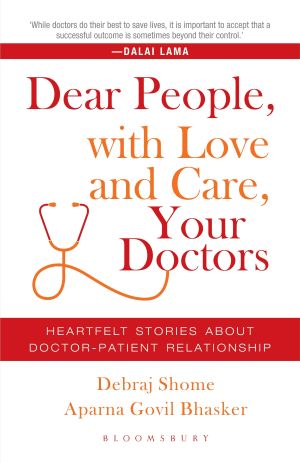‘We need many more public hospitals with good infrastructure and facilities’

Saurabh Tankha
Over decades, we have seen them scribbling prescriptions in illegible handwriting. So when the two authors of Dear People, With Love and Care, Your Doctors (Bloomsbury India), Dr Debraj Shome and Dr Aparna Govil Bhasker, expressed themselves in as many words as they did for this interview with www.lifeandmore.in, it could only lead us to one solution. The only plus, they punched in their replies on a computer, thus it was legible.
Here, we present PART II of the two-part series, an interview with Dr Bhasker who tells us that the book is a collection of heartfelt stories by doctors and patients from across the world. It provides a deep insight into the Indian healthcare system and gives a sneak peek into the world of medicine but inspires to retain faith in the relationship of a doctor and patient. The book, through inspiring stories from the diaries of 30 doctors and five patients, aims to bring back the focus on the unshakeable foundation of doctor-patient relationship.
When did you decide to collect these stories?
For the last five to seven years, the doctor-patient relationship has been facing a trust deficit. Every other day, we hear stories about doctors being attacked and hospitals being vandalised. Increasingly, this has led to a feeling of dejection in the medical fraternity. A lot of good work is being done by doctors and healthcare industry, but unfortunately, only negatives are being highlighted. Advent of social media has made it worse. Every doctor has hundreds of positive stories to tell and we wanted this book to be a medium for getting those positive stories out to common people. The idea was to showcase the positive side of medicine and initiate a dialogue through this book.
How did you go about choosing the doctors you wanted to include in the book?
Our authors are our biggest strength. All of them are extremely renowned and have done stellar work in their respective fields. All of them are ethical and compassionate and each of their stories has brought in a different perspective to this book and has helped to create this lovely kaleidoscope of humane stories. As Dr Shome mentioned, a lot of thought was put behind including the authors and it took us almost a year to do so.
How much time did it take you to get all the drafts and what plan of action did you follow thereafter?
We were very lucky as most of the authors who we invited, accepted to write for us. It took us more than two years to put this book together. Once we received the chapters, they were edited many times over. All chapters were then aligned in a similar format to maintain consistency. We then curated the best lines from the chapters and these were as headers at the beginning of every chapter. All of these are heartfelt and have been contributed by the authors themselves. A lot of research was done for putting together the “Did You Know?” facts at the end of every chapter. Every fact relates to the respective chapter and brings in perspective to all stories. At the end, we added the “doctor patient manifesto” which is first-of-its-kind. This manifesto is aimed for the benefit of patients themselves. The manifesto is very detailed and covers almost all aspects of the doctor-patient relationship. It needed a lot of thought and deliberation and we will always be thankful to Dr Lalit Kapoor for his guidance for the manifesto.
How, in your opinion, can the increasing gap between doctors and patients be bridged?
I think, first of all India needs health for all. We need many more public hospitals with good infrastructure and facilities not only for the patients, but also for doctors and hospital staff. Government must increase the healthcare spends. It will need a lot of thought and planning to overhaul the system. The present government has taken baby steps towards that but certainly a lot more commitment is needed. Hospitals and doctors also need to become more empathetic towards patients and their families. There is a communication gap and certainly there is a need for better communication. We need to have affordable healthcare and for that the government needs to support the private sector too. Of course, we need laws to curb the instances of violence against doctors and hospitals. Most importantly, our leaders need to stop criticising the medical fraternity and focus on the positives that are happening almost on a daily basis. Polio has been eradicated, people are living much longer, the rates of infectious diseases have decreased, maternal and child health has improved and so many medical miracles are happening on a daily basis. But if our Prime Minister criticises us on a foreign platform, it leads to demotivation and dejection in the community and encourages more animosity. Doctors and patients both need to be more empathetic towards each other. No doctors can survive without their patients. Similarly, no country can ultimately survive without its doctors. We need more support from the Government.
Something about yourself…
I am a very passionate surgeon and doctor. My field of specialisation is bariatric and laparoscopic surgery and I practice in Mumbai. I come from a family of three generation of defence personnel. My father was a Pilot Officer in the Indian Air Force and is a 1971 war veteran. My mother is also from defence background and she has been a teacher for most of her life. We have been brought up sans religion and gender biases and have been taught to consider ourselves equal to every other human being in this world. My husband is from Pondicherry and he is the India head of IPSOS Business Consulting. We have been happily married for 14 years and have a six year old son, Arvin. Being a doctor is demanding and means unpredictable working hours. He is the person who is most affected by this and I am truly thankful to him for understanding the demands of this profession from such a young age. I love all forms of art, be it painting, writing or surgery. That’s all my life is about.


